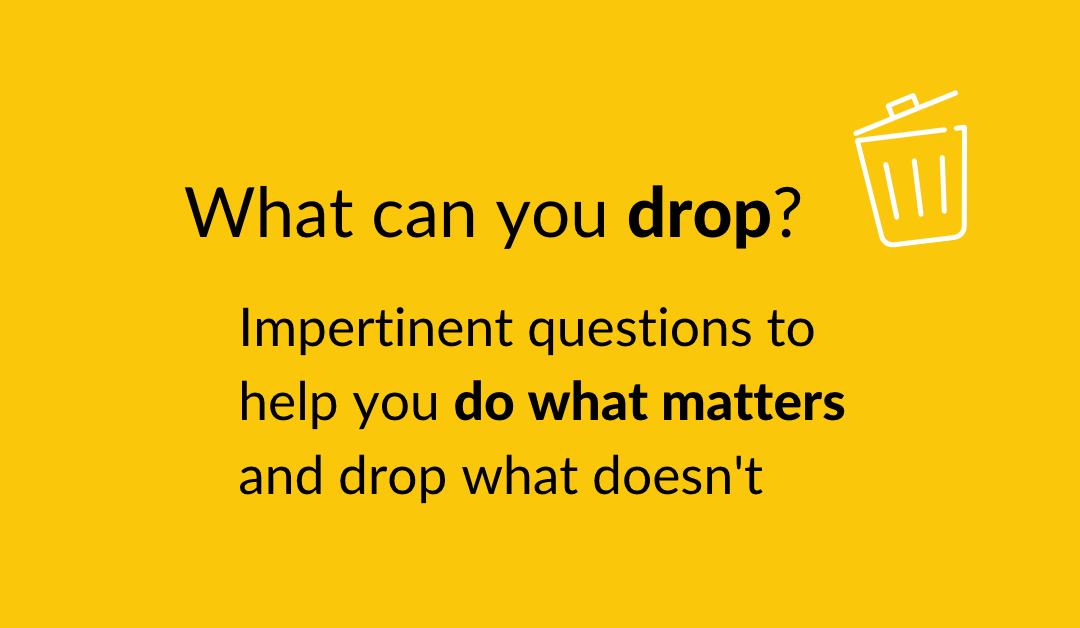Yeah, you’re right, probably nothing. Or nothing you haven’t ditched already. Because everything matters. And even when it doesn’t, it feels like it does.
Which would be fine if it all fit neatly into the day with no awkward spillage either side.[1] It’s just that, quite often, it doesn’t. So something needs to give. But what?
Thing is, when you’re used to doing loads it’s quite the mindgame to do less. We can chant what got you here won’t get you there in unison, but it can still feel like doing less = delivering less. When actually, it creates space to deliver more that matters.[2] And the more ingrained that desire to do more, the harder it is to strike stuff off your slate.
Which is where one in, one out comes in. When the leaders I work with are overworked we agree that if they add something to their slate, they have to drop something else. (Which can’t be themselves.) Because yes, they’re remarkable but no, they’re not infinite.
So how to decide what’s for the chop? Get curious, of course!
What are your inexplicable obligations? 🕸️
Feel obliged to do something? Can’t find a good reason for it? That’s an explicable obligation. It’s a like being caught in a web which even the spider has thought “meh”, and buggered off.3 We all have ‘em:
Things you do because you feel you ought to
Things for which there’s no discernible reason beyond that’s how we roll
Things for which there is a solid reason, but not one that justifies the effort
Things you feel you ought to do, but don’t, but then spend so much time contemplating it would’ve been faster just to do them in the first place
Sometimes a fresh pair of eyes is all you need. Like when a leader I worked with joined a team and discovered that the entire week was scheduled in conference calls.[3] 😩 No one had time to do the actual job. She thought “WTF”, politely declined everything, and started again with just two calls. And reader: stuff got done.[4]
Yep, an extreme example. But inexplicable obligations are neither unusual nor the preserve of idiots. That team had plenty of smart, forward-thinking people, but their process was bananas. Or had stealthily become bananas.[5] That’s part of the problem with inexplicable obligations. They’re often so well absorbed into the bloodstream of process (yours, the organisation’s) that they barely register. So your energy continues to be sucked up by tasks that don’t pull their weight.
What to do? A timely WTF can help. Or just look at your slate and get curious:
Why should you do this now?
According to whom?
Does the end justify the means?
What or who does that end serve?
You’ll probably have solid, indisputable reasons for most stuff. But there’ll almost certainly be something you can’t quite pin down. For which your reasons are vague. Or, if you’re honest, a bit suspect. This is the stuff to inspect up close. Does it pull its weight? Or is it an explicable obligation that deserves to be ditched?[6]
Who is this for?
Maybe you did all of that, and everything’s still on your slate. Maybe, while asking those questions, you realised there was stuff missing from your slate so now you’ve even more to do. 😖
In which case, ask yourself: who is this for? Who benefits from it – and in whose eyes? Do your beneficiaries value their apparent good fortune? Or do they [deep breath] not actually care? If they do care, should they own the task instead? Perhaps because they’re more invested in it. Or perhaps because they value the outcome but need to understand what goes into it. And if they really don’t care then, well, should you?
Years ago when I worked at… no actually, I’ll keep that to myself. When I worked at [ahem, cough] a lovely colleague with a firm belief in transparency would keep us in the loop. With absolutely bloody everything. Cue REAMS of e-mails, with everyone ‘cc’ed.[7] And the thing is, we needed to know almost none of it. My heart still sinks at the recollection.
My colleague wasn’t doing this to entertain himself. He did it because he thought we valued it. He didn’t check that assumption, and we didn’t disabuse him of it. It just became an inexplicable obligation: for him to overload us, and for us to wade (resentfully) through the overload.
Of course some stuff is worth doing even though it seems unappreciated. But sometimes no one benefits, or not enough to justify the effort. So again, look at who benefits from any given task. Find out: ask people if that benefit’s real or imagined, and for whom. Then decide whether it deserves its place on your slate, or someone else’s – or, frankly, no one’s.
A note of caution.[8] You might conclude that something is of benefit, and could be done by someone else, but that you’ll do it faster. You might be bang on. But in itself that’s not a reason to hold on to it. You’re not the only person who deserves to build that expertise. Or to learn from a few cock ups. And besides, if you keep doing stuff that doesn’t belong to you, you’ll be forever squeezing the stuff that does.
Where are your ghosts? 👻
Not that sort. I mean the “legacy” projects, ideas, even full blown products that still lurk in your calendar. It’s often stuff you conceived and nurtured and walked through fire to get up and running. Stuff that had meaning, and purpose. Perhaps it even made you who you were. But it isn’t relevant to who you are now. And, moreover, to who you might become.
Like wot, though?
Sometimes you start something, it runs its course, and then lingers. A mate of mine used to run ‘un-office hours’. And continued to do so long after it’d stopped being useful to him. There it was in his calendar, week in, week out, blocking up time he could be using elsewhere. He ended up ignoring it, or working round it, but it was still occupying space in the back of his mind. Until he finally ditched it. Phew.
Or sometimes you build something with huge potential – that’s never quite reached. One leader told me about an innovation project she’d worked on that could’ve been game-changingly brilliant. If people had wanted it. They didn’t. But the whole team was so invested they wouldn’t let it die. Thing is, I get that. Sometimes you do have to bide your time. Sometimes you do need to show grit and determination. And sometimes you just have to let it go so you can do something better instead.
FWIW, I think it’s bloody hard to give stuff up. Even more so if it once meant a lot to you. Closing my beloved choir seven years ago felt like exactly the right decision at the right time. But it was still a proper wrench. Likewise, an entrepreneur I know recently handed on the book group he founded 12 years ago. Then, it had been his escape from the madness of starting and scaling a new business. Now it was sucking the joy out of reading.
Some ghosts are easy to spot. A quick squiz at your calendar and they whack you in the face. Others are more resistant to daylight, lingering in the uncertain realms of ‘but’ and ‘maybe’ and ‘if’. Be brave. Slip on your proton pack and fire off some impertinent questions. After all, what have you got to lose? More to the point, what can’t you afford to keep?
🤔 Get curious about what you can drop with 5 impertinent questions
It’s not always easy to start, but impertinent questions can help. Download ‘em here. Try applying them to your schedule over the next fortnight, and run experiments on your assumptions. What actually happens when you drop, delegate or ditch altogether? Drop me a line and let me know! (I love hearing from you, I’m nosy. Etc.)
Keen to get curious and fancy a spot of help?
Get intensely curious about who you are, who you’re not, and what actually matters with Impertinent Questions. My nosiness meets your context each weekday for a month.
Get curious with The Curious Leader newsletter direct to your inbox. Longform, practical, personal opining on curiosity in leadership. Like today’s on FOBFO-busting, or this one on owning your success.


